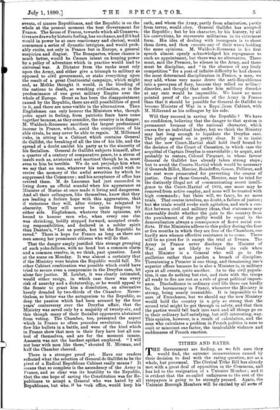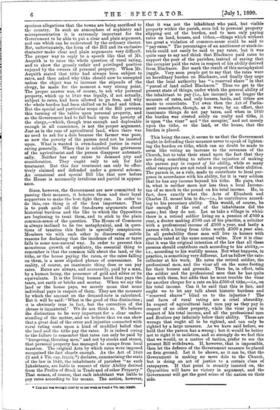TITHES AND RATES. T HE Government are finding, as we felt
sure they would find, the extreme inconvenience caused by their decision to deal with the rating question, not as a whole, but piecemeal. The Clerical Tithe Bill has already met with a great deal of opposition in the Commons, and has led to the resignation of a Unionist Member ; and it is evident that the so-called unfairness to the rest of the ratepayers is going to be strongly pressed. Again, the Unionist Borough Members will be excited by all sorts of specious allegations that the towns are being sacrificed to the country. In such an atmosphere of sophistry and misrepresentation it is extremely important for the Government to be able to put a clear and plain argument, and one which can be understood by the ordinary elector. But, unfortunately, the form of the Bill and its exclusive character make clear and plain arguments very difficult. The proper way to reply to a speech like that of Mr. Asquith is to raise the whole question of rural rating, and to show the grossly unfair and privileged position enjoyed by the owners of personal property. When Mr. Asquith stated that tithe had always been subject to rates, and then asked why tithe should now be exempted unless the object was to increase the stipends of the clergy, he made for the moment a very strong point. The proper answer was, of course, to ask why personal property, which up to 1840 was legally, if not actually, subject to rates, had been allowed to go free, and why the whole burden had been shifted on to land and tithes. But the special and particular scope of the Bill prevents this turning of the tables upon personal property, and so the Government had to fall back upon the poverty of the clergy,—which, though true enough and deplorable enough in all conscience, is not the proper argument. Just as in the case of agricultural land, when there was no need to ask for a dole because the farmer was poor, so now the poverty of the parson need not be insisted upon. What is wanted is even-handed justice in rural rating generally. When that is achieved the grievances of the agriculturist and the parson disappear automati- cally. Neither has any cause to demand pity and consideration. They ought only to ask for fair treatment. But this fair treatment can only be effec- tively claimed and defended under a general scheme. An occasional and special Bill like that now before the House is necessarily invidious and partial in appear- ance.
Since, however, the Government are now committed to passing their measure, it behoves them and their loyal supporters to make the best fight they can. In order to do this, one thing is of the first importance. That is to push aside all the fine-drawn arguments about historical burdens and the like to which the Opposition are beginning to treat them, and to stick to the plain common-sense of the question. The House of Commons is always inclined to be too metaphysical, and in ques- tions of taxation this fault is specially conspicuous. Members vie with each other in discovering subtle reasons for declaring that the incidence of rates or taxes falls in some non-natural way. In order to prevent this monstrous growth of sophistry, the essential thing to remember is that the common talk about the land, or the tithe, or the house paying the rates, or the rates falling on them, is a mere slipshod phrase of convenience. In reality, of course, no inanimate thing does or can pay rates. Bates are always, and necessarily, paid by a man, by a human being, the possessor of gold and silver or its equivalents. It is the living human hand that pays the taxes, not earth or bricks and mortar. When we say the land or the house pays, we merely mean that some individual pays in respect of them. They are the measure by which the amount on the demand-note is calculated. But it will be said: 'What is the good of this distinction; it is obviously true in fact, but the correction of the phrase is immaterial.' We do not think so. We believe the distinction to be very important for a clear under- standing of the matter, and we believe that we can show that a great deal of the error and injustice connected with rural rating rests upon a kind of muddled belief that the land and the tithe pay the rates. It is indeed owing to the failure to remember that rates can only be paid by " hungering, thirsting men," and not by stocks and stones, that personal property has managed to escape from local taxation. The original Acts by which rates were imposed recognised the fact clearly enough. As the Act of 1840 (3 and 4 Vic. cap. lxxxix.*) declares, summarising the state of the law in 1840, the inhabitants of parishes "as such Inhabitants, are liable in respect of their Ability derived from the Profits of Stock in Trade and of other Property." That means, of course, that each inhabitant was liable to pay rates according to his means. The notion, however, • This Act WM wrongly dud by us last week as I sad 4 Vic. cap. Lug% that it was not the inhabitant who paid, but visible property within the parish, soon led to personal property slipping out of the burden, and to men only paying rates on land, houses, and tithes,—things which without too great a violation of common-sense could •be said to "pay rates." The percentages of an auctioneer or stock-in- trade could not easily be said to pay rates, but it was quite easy to say and think that Blackacre paid rates to support the poor of the parishes, instead of saying that the occupier paid the rates in respect of his ability derived from Blackacre. But mark the result of this metaphysical juggle. Very soon people got to say that the rates were an hereditary burden on Blackacre, and finally they urge that the local authority has "a reserved share" in that "parcel of land called Blackacre." Thus we get to the present state of things, under which the general ability of the inhabitant to pay (i.e., his income) is no longer the measure of rates, and only houses, lands, and tithes are made to contribute. Yet even then the Act of Parlia- ment remembers, though, as it were, by an effort, that inanimate things do not pay taxes, and when in 1840 the burden was riveted solely on realty and tithe, it is upon "the vicar" and "the occupier," and not merely upon the tithe, or the land, or the house, that the burden is placed.
This being the case, it seems to us that the Government ought in defending their measure never to speak of lighten- ing the burden on tithe, which can no doubt be made to seem like voting an increase to the revenues of the Church, but to take their stand upon the fact that they are doing something to relieve the injustice of making the parson pay in respect of his ability, while so many other ratepayers are not rated in respect of their abilities. The parson is, as a rule, made to contribute to local pur- poses in accordance with his ability, for it is very seldom that be has any income beyond his tithe. He pays, that is, what is neither more nor less than a local Income- tax of so much in the pound on his total income. He, in fact, does exactly what the Acts of Elizabeth and Charles II. meant him to do,—i.e., he contributes accord- ing to his pecuniary ability. This would, of course, be fair enough if the rest of the inhabitants did the same ; but they do not. Let us take a village in which there is a retired soldier living on a pension of £500 a year, a doctor making £500 out of his practice, a solicitor with a professional income of £500 a year, and lastly a parson with a living from tithe worth £500 a year also. In all probability these men will live in houses with grounds rated at the same annual value. Now it is clear that it was the original intention of the law that all these persons should contribute each according to his ability,— Le., according to his worldly means. But what happens, in practice, is something very different. Let us follow the rate- collector at his work. ' He rates the retired soldier, the professional men, and the vicar all on the same footing for their houses and grounds. Then he, in effect, tells the soldier and the professional men that he has quite done with them, but adds that he must trouble the vicar for another cheque for a rate on his £500 of tithe,—i.e., on his total income. Can it be said that this is fair, and ought we to let any talk about historic burdens and "reserved shares" blind us to the injustice ? The real facts of rural rating are a cruel absurdity. In respect of agricultural land men pay as they pay in respect of no other property, while the vicar pays in respect of his total income, and all the professional men and Bentiers pay infinitely below their ability. These are wrongs that ought all to be righted, and can only be righted by a large measure. As we have said before, we hold that the parson has a wrong ; but it would be better not to right it in isolation, and so strongly do we feel this that we would, as a matter of tactics, prefer to see the present Bill withdrawn. If, however, that is impossible, then let the defence of the Government measure be placed on firm ground. Let it be shown, as it can be, that the Government is making no mere dole to the Church, but is doing an act of justice to a certain class of ratepayers. If that point is steadily insisted on, the Opposition will have no victory in argument, and the Government will get the good sense of the nation on their side.
















































 Previous page
Previous page